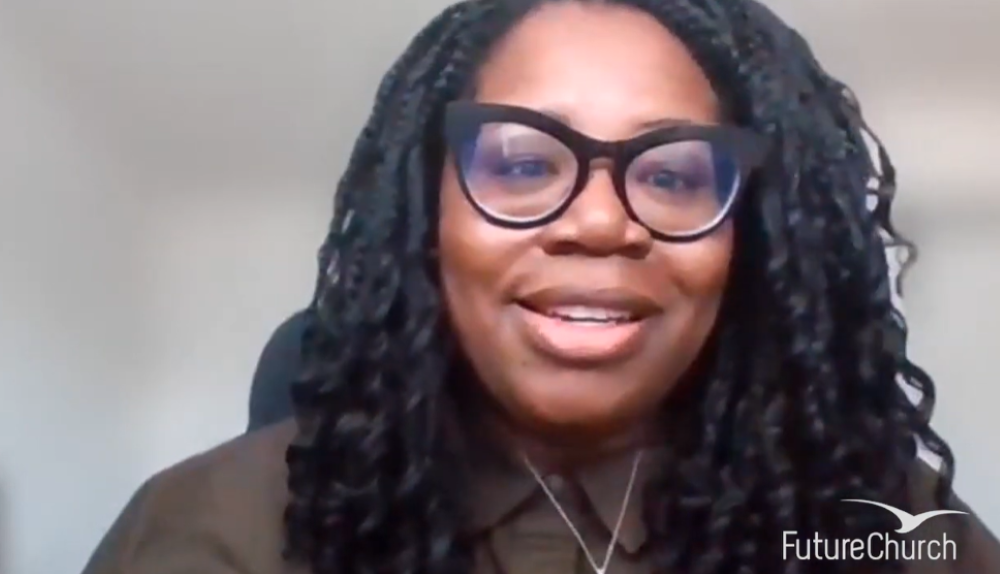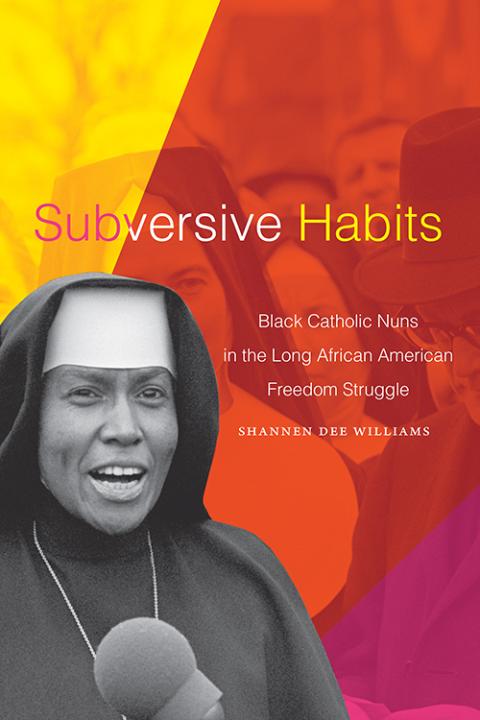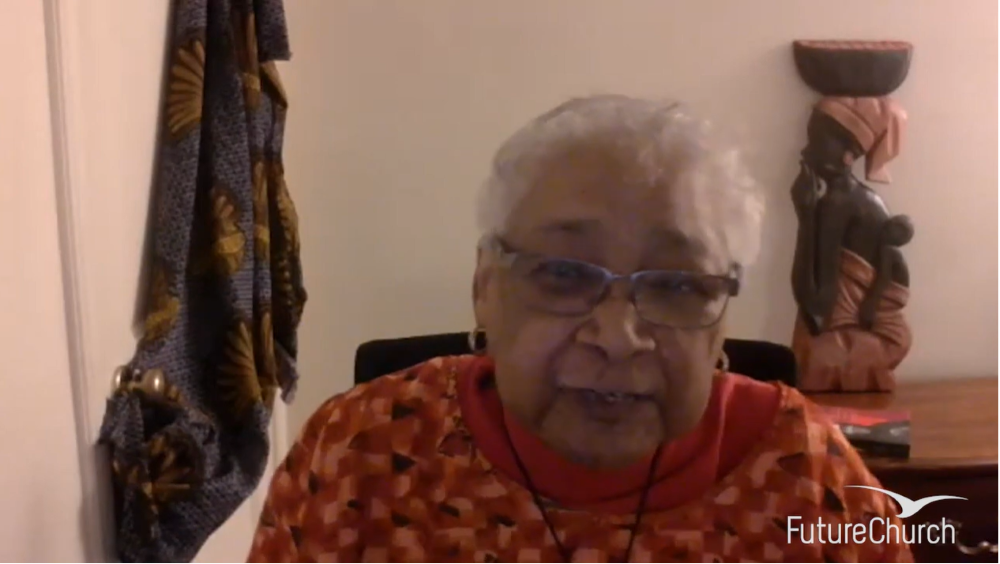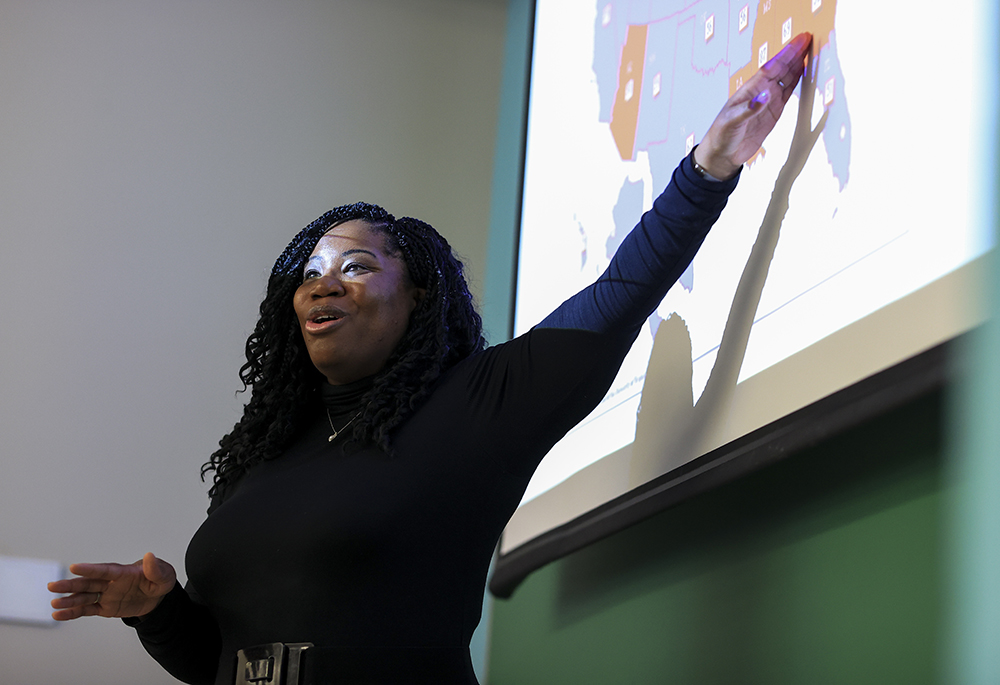
Shannen Dee Williams speaks Aug. 30 to the 150 Catholics gathered virtually for a four-part study of her book "Subversive Habits: Black Catholic Nuns in the Long African American Freedom Struggle." (GSR screenshot)
In August, approximately 150 Catholics gathered weekly for a virtual four-part study of Subversive Habits: Black Catholic Nuns in the Long African American Freedom Struggle, sponsored by FutureChurch. This examination of the pioneering research by Shannen Dee Williams drew both Black Catholics and white Catholics. It also drew members of religious communities.
This intentional, albeit temporary, community of seekers understood that they were being invited to bear witness to a difficult truth about our Catholic history, a truth that had long been submerged and denied. Using the tools of faith — prayer, song, study and witness — the group learned, listened deeply and held themselves accountable as they explored gut-wrenching realities together.
A slaveholding, segregationist church
Like the rest of white America, white participants, which made up approximately 80% of our group, had received a sanitized version of slavery and segregation in history classes. The white educational enterprise shielded them from the abject violence and brutality of the slavery regime while obscuring the ways it shaped — indeed, corrupted — economic, social, and political life, disproportionately rewarding white citizens and disadvantaging Black citizens.

The cover of "Subversive Habits: Black Catholic Nuns in the Long African American Freedom Struggle" (Courtesy of Duke University Press)
And while 130 million Americans got their first unvarnished look at the ravages of slavery and segregation by watching the 1977 miniseries "Roots," based on Alex Haley's 1976 novel of the same name, many whites defensively dismissed notions of personal responsibility, blamed the victims of the brutal white and took credit for abolition. For them, bad white people inaugurated slavery and good white people stopped it.
This sanitizing mythology was further substantiated by white Catholics who trusted in the virtue of their church on this matter. They believed the institutional church had not only stood against slavery and segregation from the beginning but had consistently worked to dismantle it.
But Williams' research challenged those consoling myths by demonstrating the Catholic Church's complicity in slavery and segregation. Catholic popes not only inaugurated the transatlantic slave trade, they enriched their coffers by buying, selling and using slave labor in building their missions. Further, the Catholic Church was one of the largest practitioners of segregation during the Jim Crow era, keeping Black Catholics out of their orders, seminaries and churches.
Connecting past to present
The connection between the church's collusion in our racist past and present-day racist violence from white America was not lost on these participants. One reflected that learning more about the church's racist past "helped me understand why the Church continues to fail us by not addressing the racism that is still so prevalent today."
Others attested to the transformative power of opening oneself to the witness of those who have experienced racism within our church and society.
[The book] gave me a different lens through which to understand the perniciousness of racism in the United States. Seeing it so vividly lived out in the Church made me understand, viscerally, how White Supremacy has completely saturated our entire society. I thought I knew about this, but my knowledge before reading this book was somewhat detached and cerebral. I am White. I am in a new space of reckoning.
Some spoke of their exasperation with the noxious mix of racism and religion.
This pernicious attitude and mindset continues into the 21st century, among Christians and especially among Catholics who seem to me to hold themselves above all this evil. Having read Robert Jones' 'White Too Long,' I am nearly fed up with the American Catholic Church.

Sr. Josita Colbert, a Sister of Notre Dame de Namur and president of the National Black Sisters' Conference, speaks Aug. 23 to the 150 Catholics gathered virtually for a four-part study of Shannen Dee Williams' book "Subversive Habits: Black Catholic Nuns in the Long African American Freedom Struggle." (GSR screenshot)
Pioneering Black women in majority white congregations
While the chief focus of Williams' work is to correct the historical record and recover the prophetic work of Black Catholic nuns who confronted the racist institutions of their day, that story could not be fully understood without shining a light on some hidden aspects of white congregational life.
While recognizing that white sisterhoods were a pioneering force in spreading the Gospel in the United States, Williams contends that few have considered that "before 1850 white congregations, including some of the earliest saints and sainthood candidates, relied on the labor, sale, and brutal mistreatment of enslaved people — and the economic benefits of whiteness and racial segregation — to establish and secure the financial futures of their orders."
According to Williams, most white congregations "enforced racial exclusion and institutionalized ideas of white superiority and Black and Brown inferiority in their ranks and social service ministries for most of their histories," facts that remain "one of the Church's best-kept secrets."
And, as many Black women attested in oral interviews with Williams, "when white sisterhoods did admit African Americans into their novitiates and convents, this rarely translated into integration — let alone sincere inclusion — without intense Black struggle and suffering."
Sr. Josita Colbert, a Sister of Notre Dame de Namur and president of the National Black Sisters' Conference who joined the book study's third session as a presenter, confirmed that this intense struggle and suffering still occurs today. She explained that the lack of respect that some Black women suffer in majority white congregations often results in their leaving the congregation or reconsidering their vocations in religious life. Many religious vocations have been lost as a result.

Shannen Dee Williams, associate professor of history at the University of Dayton, speaks to her students during a class April 21 in Dayton, Ohio. Williams spent 14 years researching America's Black nuns, and her history of them, "Subversive Habits," will be published May 17. Williams found that many Black nuns were modest about their achievements and reticent about sharing details of bad experiences, such as encountering racism and discrimination. (AP photo/Aaron Doster)
Participants respond
Many participants responded to the legion examples of anti-Black racism with sadness, anger, shock and indignation. One participant wrote, "The history of racism in American Catholic (white) women's congregations is a real gut punch."
Another expressed indignation:
[What most troubled me was] the discriminatory attitudes and hard racism and supremacy of white sisters who saw themselves as generously serving "inferior" people, while being destructive of the self-esteem of those children.
A common thread for white Catholics, many of whom had obtained a Catholic education, was the recognition that their education had been devoid of Black Catholic history and the complicity of their church in racism.
I have had 16 years of Catholic education and many more years of activity, starting with charismatic prayer group, Cursillo, religious education teacher, divorced Catholics ministry, RCIA team member — [but this knowledge] brought me to tears when I realized all that I had not been aware of.
A self-identified Black Catholic who had been a student of the Oblate Sisters of Providence, the first successful Catholic women religious congregation established by women of African descent, expressed her surprise about the role racism played in the church.
As a cradle Black lay Catholic who was taught K-8 by the Oblate Sisters of Providence, I didn't know such intolerance, hatred and just plain awfulness existed in our Church.
For others, grief and anger catalyzed them to question their own lack of awareness.
The heavy reality of the book, the content on the life in sisterhoods broke my heart, angered my psyche, and made me question my own blindness.
While not thinking of myself as a white supremacist all these years, I believe that is what I have been. No excuses.
White women religious awakened
Self-identified white women religious shared their experience engaging with Williams' research, confirming some of Williams' key points about the pitfalls of white-led educational and social ministries in Black communities.
All of this was eye-opening to me. Even though I had ministered in the Black community for over a third of my time in this diocese and had some contact with Black Sisters from NSBC in the 70s, I did not have an appreciation of the overall issues addressed in the book study.
Having taught in our integrated schools and being in touch with some of these young Black women even today, how ignorant I was/am of their experiences. Our schools did seem a safe place for them to be themselves to some degree and, fortunately, leadership opportunities were available to them. I was not conscious that these young women were not encouraged to pursue religious life.
With regards to congregational life, many expressed sadness over the fact that they had been unaware of the realities Black women faced throughout the history of the church and in their religious communities. One religious wrote that the most important takeaway from the study was "how much I don't know and how much we were not told in our formation as Sisters in the early 60s about the reality in our world at the time."
Others expressed similar opinions.
As a member of a religious community which had a few women of color at the time when I entered, I had never understood what they had experienced and why they did not stay. I am surprised now that I was so oblivious at the time.
To be honest, until recently, I had not given much thought to the reasons the few Black women were drawn to my community and to why they had left. Presently, we have one Black sister who has remained for 29 years, and I did not wonder what she found in my community to support her all these years. Thank you so much for the opportunity to open my mind and heart through these sessions!
Prophetic Black Catholic nuns shaping our faith
If Williams' objective was to weave the crucial witness and prophetic work of Black Catholic sisters back into our common Catholic narrative, she was effective.
Participants learned that the story of Black Catholicism in America began long before 1619 and, since those beginnings, Black Catholic nuns have been leaders in the freedom struggle and prophets for our time. One participant captured the spirit, writing: "The tenacity of our Black sisters and their strong belief in the Church drove them to keep up the fight. God bless every one of them."
The enthusiasm for proclaiming the good news of Black Catholic sisterhoods was expressed by a participant: "The stories of these great Black Catholic Sisters should be told from every pulpit, every classroom, every adult gathering, and RCIA program!"
Another expressed the need to make sure younger Catholics know the history.
[The most important takeaway was] how much Black Catholics have contributed to Catholicism in the US under horrific situations. Their commitment and persistence are incredible. Their stories need to be told and heard by the young. The youth are today's Catholics and they need to know the truth so that racism can be addressed and stopped.
Black Catholic participants express hope
Self-identified Black Catholic participants expressed satisfaction with the fact that white Catholics were present and open to learning more about the Black experience in the Catholic Church.
One wrote, "I am happy that [this study] was brought to a predominantly white upper middle-class audience."
Another spoke of the importance of recovering the history of Black Catholics, Indigenous Catholics and other Catholics of color advocating that the promise and the failures of our church be taught to all Catholics with honesty and integrity.
As a Black Catholic and convert, I was delighted to find this study and participate in this very important dialogue. Catholic education has an important role to play in lifting up Black Catholic history, indeed its vast history with indigenous people and people of color worldwide. But it must be done with honesty, integrity, and a Spirit of reconciliation. I felt [that Spirit] was evident in this study. There was no spirit of guilt or appeasement. The truth, even hard truths like those presented in this book will set free any and every one willing to receive the deliverance it offers.
Still another reflected on the Catholic education they received and the insights gained later in life.
This was kind of a walk down memory lane. I got my Catholic education in the church, in the early 1960's, with hippy priests and nuns. Looking back now I guess it was more of a missionary experience. I remember prayers, cues of when to kneel, sit, stand, songs to this day. Hearing from others in the small groups I was surprised at the different experiences we all had. Realizing I was too young to understand the racism, bigotry that was there I thought this was the best of times. It was a shock later in life.
Advertisement
Racial and reparative justice
The imperative to work for racial and reparative justice was voiced over and over by participants. One wrote, "We have an obligation to provide reparations, both financially and educationally, and to acknowledge and apologize to Sisters of color in our own congregation and throughout the Church."
Another suggested that the church should develop "a plan of action that can be adapted to each parish and community."
One voiced the need for reconciliation: "I believe the reality of the experience of African-Americans needs to be acknowledged. Many religious communities still have not apologized for their behavior."
Finally, one participant made clear that their belief in God was the key to a world where all God's children were celebrated and loved.
I have faced racism in the church, inside the church, outside the church, often mistaken for somebody people perceive as one of them. I believe in GOD, creator of the awesome heavens and earth. How can I look at this splendor and not think that my Lord and my God has wanted good for us ALL? We come in different colors as the rainbows in the skies, we should be celebrated as wonders of his creation. I understand that only through love of Jesus will I be saved. Thank you for educating me, giving me the tools to search and inform myself, and seek truth.
Learn more and view the videos from the series here. Download all FutureChurch's Women Witnesses for Racial Justice resources here. (Select the project "Women Witnesses for Racial Justice.")





